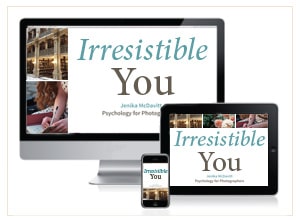The Blog Library
Get Whatever You Want Without Arguing: The Magic Words
It’s when a client does something that feels scuzzy.
Something that isn’t technically against your contract, but you’re still pushpins-in-your-pants uncomfortable with it.
Or when you go buy something at a store, then get home and realize that the coupon (which was the whole reason you bought the item) is still folded neatly at the bottom of your purse. You want to go back and ask for the value of the coupon, even though they’d have every right to refuse.
Or when a friend is acting in a less-than-loving way, and you know bringing it up might result in explosion rather than relief.
When you get that familiar iron weight in your stomach.
The oh-crap moment when you need someone to do something, but the power really lies with them. All you can do is ask. Cap in hand. And risk getting a cold, gelatinous blob of NO thrown in your face.
Times like this call for The Magic Words.
These Magic Words have served me well. They’ve helped me in all the above situations, and more.
They got me out of taking a dreadful “required” course in college. They got a stingy landlord to replace scuzzy bathroom floors with bright and shiny tiled ones. They’ve gotten answers from local government. They’ve gotten banks to refund stupid fees, music-blasting neighbors to turn the volume down, and a few perennially cranky receptionists to smile for the first time in maybe a decade.
Essentially, they help me get something done when the other person is holding most of the cards.
These Magic Words save me hundreds of dollars and hours of headache every year.
What are these Magic Words, you ask?

Repeat after me:
“What can we do about this?”
As in:
“Hey there, store customer service! I did something really silly yesterday. I went and bought a Snazzle, but stupidly forgot to use the Snazzle $25 off coupon in my purse. I’m really excited about my Snazzle, but feel really dumb for forgetting the coupon. What can we do about this?”
– or –
“Hey friend! Listen, I know you love to bring your dog with you everywhere you go, but when Snugglemuffin comes over, I find myself sneezing afterwards. What can we do about this?”
– or –
“Hey client! I’m so glad you love your images. Listen, I know we haven’t ever discussed this, but I wanted to ask you something. I noticed that ______________, and when that happens, I feel ________ because _______________. What can we do about this?”
Here is why the magic words work, a good 8.3 times out of 10:
1) They make the person feel like the solution instead of the problem.
If you straight-up say “I want my money back,” “Leave your dog at home,” or “Take that photo down immediately,” you’re making them feel like they did something wrong. And when people feel like that, they get defensive and illogical.
If you ask for their help instead, they’re far less likely to get defensive and say “no” purely out of pride.
The Magic Words frame them as a problem-solver instead of just a problem.
They allow the person to feel generous for suggesting they give you the $25, that they leave their dog at home, or that they take the photo down. People who would deny a demand will happily suggest the same solution if given the chance – because it makes them feel good.
2) It names you as a team.
When you label yourselves as a “we,” you’re forming a you-me team. People are eager to argue if you make them feel like an enemy, but people generally don’t want to screw over their teammates.
Plus, the Magic Words acknowledge that maybe the both of you need to take action to solve the problem – you’re not just dumping it on their doorstep.
Maybe the friend can’t leave the dog at home for some reason, so asking that will get you nowhere. But they could suggest meeting up at a park next time so that you both get what you need.
It’s the same thing for a client or a company. Saying “we” implies that you’re in this together, and that you’re ready to do something, too.
3) When the other person makes the first move, it usually puts you in a better negotiating position.
Here’s a strong secret I’d rather keep to myself:
If you’re the first one to propose a solution, you’ve shown your hand. You’ve told them what you’re willing to settle for – and sometimes that’s a lot less than what the person could have given. Having them make the first suggestion gives you leeway to bargain them up or down.
Sneaky, huh?
Another reason to avoid making the first move is that, especially when you’re dealing with customer service, the other person might have the ability to solve the problem in a way you’d never guess on your own.
For example, the bank might have a granite policy not to refund some obnoxious fee, but they might be able to give you X credit that makes up for it instead.
If you fixate on the solution you want (the refund) then they can only repeat the company line. If you make them your partner-in-problem-solving, they are quite frequently more willing to get creative to find a solution you couldn’t have come up with on your own.
4) Even if the person doesn’t want to give you what you want, they usually feel like a jerk for having no response to The Magic Words.
When you say “What can we do about this?” – the other person rarely wants to say “Nothing.”
If you proposed a specific solution, they might have no problem saying “Well, ma’am, company policy is blah blah blah.” But when you say “What can we do?” they usually feel like a miserly jerk for saying “Nothing.”
Similarly, a friend or client will realize that they’ll come off as selfish and unreasonable if they say “There’s nothing I can do,” even if they don’t want to change their behavior.
Even if there is truly nothing they can do, they’ll usually try to come up with something to avoid saying “Nothing.”
So next time you’re in a sticky situation, give “What can we do about this?” a try.
“Abracadabra” does nothing, but these magic words can move mountains of stony hearts.
Let me know how they work for you!!
Want to learn some more neat tricks for connecting with people quickly?
There are so many tools to take advantage of that I can’t cover thoroughly on the blog.
Many of them have to do with adding personality and empathy into your business – to help get clients to do what you want, and also persuade in ways that traditional advertising can’t.
I created a course to take you through start to finish. This class gives you dozens of ways to persuade and captivate, no matter who you are or where you’re starting from.
 This class is for you if you’ve ever tried to write about yourself and said:
This class is for you if you’ve ever tried to write about yourself and said:
I don’t know what people want to hear!
I’ve tried, but just feel like I’m bragging!
My life is just not that interesting.
I’m a private person / introvert, I don’t want to share much.
Whenever I go to write about myself, it comes out sounding dumb.
I don’t know how to sound like ME.
Connecting on a personal level in business does not have to be hard or mysterious. Most people simply never learned how to bring their personality into a business context (or were actively discouraged from doing so), and we can fix that.
 In this class you’ll learn:
In this class you’ll learn:
- What clients actually want to hear about you, personally
- Five psychological influences that make personal sharing smart business strategy
- How to talk about yourself without feeling self-absorbed or boastful
- How to pick stories that will draw your ideal clients in
- The “it girl” secrets to dominating online (that even an introvert can steal)
- How to sound like yourself when you write
- Two secret tricks to being memorable – no matter your personality
- How to find the right balance of personal and professional for YOU
- The Never-Ending Content Generator strategy for never running out of ways to connect with your reader (seriously – you’ll have a year’s worth of blog posts in no time)
You’ll also get an exclusive invitation to our live annual virtual retreat.
Where you can ask questions that arise as you put these skills into practice, plus see how other people are making the ideas work for them.
It’s kind of like a conference, but the kind where you get to sit at home in your comfy pants. I might make admission contingent on you having a nice mug of tea at your desk, though. Might. 😉
Irresistible You is available for $219 only $119, today through November 10th ONLY.
Save $100 by buying now – this is the lowest price it will ever be.







Simple but fantastic advice! My partner actually uses this ALL the time; to me, to his customers (he’s a mechanic) and it really works.
What great advice! I am definitely going to try this out. I’m usually fairly fairly good at diffusing situations, but I really like this tactic. Thank you for sharing this.
Such simple, sound advice. I’m definitely going to give this a try the next time there’s a conflict. Thanks!
Brilliant post, wish I’d read it yesterday. Never mind I know I’ll still have many other opportunities to use the magic words. I love your blog, you are so great at what you do.
excellent advice, i’m loving it and will put it immediately to use. Another thing my dad told me (he is an expert in negociation) is that you should get the person try to answer yes to questions. Even if the question is irrelevant, only by saying the word “yes” it puts the person in an “afirmative” mood making it more likely to get a compromise
This is such an eye-opener! I’m definitely going to try this with my clients ( and everyone else for that matter LOL) and see how that goes. Thanks for sharing!